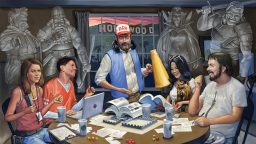A bunch of guys sit around a table. One of them—the Game Master—says: “The room is dark, lit only by your flickering torches. In the middle of the room is a squat statue of the Bloated God, carved from an unknown mottled green stone. In his hands is a metal bowl, inside of which is the object of your quest.”
One of the other people sitting around the table—a player—says: “I approach the statue carefully. I check the floor tiles around the statue to see if any of them are cracked.”
The Game Master says: “The tiles on the floor are gray slate. None of them are cracked, but one is significantly darker, almost black.”
Another player says: “My character approaches the black tile cautiously…”
That’s it. That’s roleplaying. Period.
The genre may differ, the game mechanics may differ, the details of character and scene will differ, but all roleplaying is exactly this.
Lots of people are going to try to obscure this truth by filling your mind with counterproductive nonsense. They’ll throw out misleading analogies (“It’s like you and your friends cooperating to tell a story…”), use pretentious verbiage (“One must not engage in Blocking the Acts of another Participant’s Character Avatar…”), or distract you with matters of dice, rules, rulings, and other such minutia.
Don’t listen to them. They’re all wrong. None of those things have anything to do with what roleplaying actually is.
This is roleplaying. It works in any given genre, with any given RPG rules system, and at any table:
Shadowrun. The GM says: “You walk into the coffin motel. The old ork lady behind the counter frowns at you and sniffs. ‘1 nuyen an hour,’ she says. ‘You’re responsible for bedding. Bathroom’s at the end of the hall.'”
The player says: “I approach her, smiling. I say ‘Excuse me, darlin’, I’m looking for a friend of mine. Tall guy, elf, light skinned, wearing a mohawk. No chrome. You seen him?’ “
The GM replies: “She shakes her head. ‘I don’t remember seeing anything.’ She looks at you meaningfully.”
Another player says: “She wants a bribe, dude. Chainsaw walks over and hands her a fifty nuyen note…”
That’s it. Stripped of fripperies, that’s what roleplaying is.
- The GM describes the situation.
- The players decide what to do, and describe their actions.
- The GM adjudicates what happens as a result, and describes the new situation.
This is the play cycle. You run through it again and again, and sooner or later you have a session, an adventure, and then a campaign.
Champions. The GM says: “The Noose has the police commissioner tied to the front of her getaway vehicle. His eyes are wide in fear and though you can’t hear him above the traffic, he’s obviously screaming as she takes corner after corner on two wheels.”
One player says: “Speed Limit races ahead of the truck, and scatters some caltrops on the road.”
The GM says: “The truck hits the caltrops. The front tires explode. The truck goes out of control and swerves left. It’s headed for a drop into the viaduct.”
Another player says: “I’ll have Hard Rock try to grab the rear axle as the truck’s about to go over…”
- DM describes.
- Players decide what to do and describe their actions.
- DM adjudicates their actions and describes the new situation.
This is roleplaying. Anything which enhances this cycle is good. Anything which detracts from it is bad.
You may accidentally obscure the issue. You may get caught up in great Internet wars (or arguments at the table) about the right dice, rules, classes, play styles, adventure design, and so forth. Just remember: all of that is secondary to the fundamental cycle of play. Get that right—practice until you get that right—and the other things almost don’t matter at all.
This is the core of roleplaying. It is not an optional part. Do it well or do it badly (preferably the former), you and your players must do it or the game’s gonna suck.
As a GM, you focus on describing the game world (not the mechanics, the situation and events in the game world), providing enough info that the players know what’s going on. Then let the players respond. If necessary, ask the players “What do you do?” to prod them along.
As a player, you focus on listening to the description, deciding how to respond (as quickly as possible), and communicating your character’s actions to the GM. Again, not the mechanics. What your character does in the game world. Description, not dice.
As a GM, you listen to the players describe their action, and adjudicate what happens as a result. Maybe you need to roll some dice, maybe the players do, but always remember that rolling dice is the option of last resort, only to be used when you have no other means of adjudicating their actions. Maybe the GM had players roll dice to adjudicate the situations above, maybe he didn’t. The important thing is he made a judgment, then described the new situation, and play continued.
There’s a lot of other complications that come after you get the cycle right—rules heavy or light, skill or class based, miniatures or no, etc.—but all of that, ALL OF THAT, is secondary to understanding, practicing, and implementing the Describe->Decide & Describe->Adjudicate & Describe game cycle.
This IS roleplaying. Nail this, and everything else will follow.
Jasyn Jones, better known as Daddy Warpig, is a host on the Geek Gab podcast, a regular on the Superversive SF livestreams, and blogs at Daddy Warpig’s House of Geekery. Check him out on Twitter.
This is correct. I’m GMed Champions, Mage the Ascenion, Vampire the Masquerade, Marvel Supers (the original), AD&D, D&D 3.0, and Multiverser: the Game.
Tell ’em, Daddy Warpig!
Nicely put. That’s a great clarifier for those of us who don’t get enough table time to hash it out trial-and-error.
Rock on, hoss!
